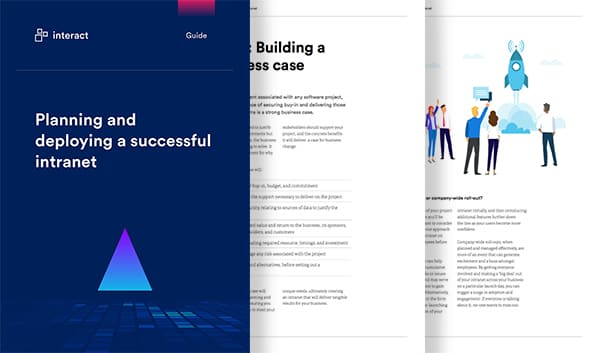Sharing failure: why we need to talk about what went wrong
We get it — mistakes happen. And while it may be tempting to keep it a secret and silently move forward, sometimes there’s more value in sharing your failures than sweeping them under the rug.
Mistakes can be embarrassing, so much so that your organization’s first instinct may be to keep it under wraps and solve the issue ASAP. What you may not realize, however, is — you are not alone.
Chances are, there are a number of companies out there making that very same mistake.
But what if you could have saved them the headache? Success stories aren’t the only kind that need to be revealed.
Facing your fears does not only have to mean fixing the problem, sometimes it can mean openly discussing your failures. Learning vicariously is an essential way for others to learn from your success. This shows just how powerful sharing your story can be.
Problem-sharing can easily lead to problem-solving. With the right attitude, your organization can quickly go from failure to inspiration. Here are a few reasons to share your story:
Build strong internal and external connections
In the past, we’ve explored the many ways that storytelling can be a secret weapon for internal communicating success. However, the stories that need to be told should not be limited to just the victories.
The people that decide to listen to what you have to say will want to know who you are; that includes both good and bad.
Revealing your shortcomings to the world is not an easy feat, and your fellow peers know this. Braving that fear for the sake of collaboration can earn you some much-deserved respect and consideration.
Storytelling has the power to touch the emotions of each and every person present. Stories can get our brains working, inspire us and appeal to our empathy.
Because of the addition of this human element, you leave individuals with a sense of camaraderie and a story of value.
We cannot stress it enough — people want authenticity. Honest storytelling that shows where you thrived AND where you nose-dived is what creates a bond between you and your listeners.
Broadcasting disappointments is more than just a method to teach lessons, it’s a medium for connecting people at all levels.
Airing your “dirty laundry” is not quite the crucifixion it may seem. Just as you recovered enough to tell your story, others will understand and ultimately draw strength from your tale.
It’s essential that you create and reinforce those relationships. Who knows, maybe next time you’ll be the one to learn from them.
Others can learn from your mistakes
You may be asking yourself: A failure story? Why would any successful individuals want to dwell on their misfortunes?
The truth is: the best leaders are the ones that reflect on their failures. And these individuals are the ones that others look to steer them on the path to success.
It may not always be easy to publicize, but your failures are what shaped your career and revisiting them can only strengthen you and those around you.
Become a thought leader in your field not because you get everything right, but because you’ve already gotten everything wrong. Once you realize this, you are genuinely ready to impart your knowledge onto others.

There’s no need to sugar coat what happened or point fingers. Your listeners want to hear the whole truth, and that includes you taking accountability for your role in the catastrophe.
The months you spent searching for a solution — reveal it. The advice you gathered from other pros — share it. Use your experiences as a lesson for those who may be on the path to disaster.
Ultimately, you’ll become a “beacon of positivity” as you create a platform where entrepreneurs admit where they went wrong to help their peers avoid making the same mistakes.
Reflection fosters innovation
Leaders who experience success have an opportunity to share their journey, and not through rose-colored lenses.
There are ups and downs to any journey and sharing them allows your audience to reflect on your choices and solutions.
You do not necessarily need to have all the answers. However, opening your failures up for discussion will give others the chance to pick up from where you left off.
Sometimes, other individuals just need to know they are not alone in a situation to inspire them to find their own solutions.

Regardless of the platform, encourage open and honest conversations about the realities of business success. Give a step by step account of where you went wrong to help your peers avoid making the same mistakes.
Having a realistic idea of what to expect on their journey to the top enables your colleagues to find and narrate their own stories with a head start.
What they discover can lead to a whole other realm of possibilities. Who knows, their solution may just be something you’ll be implementing the next time things come crashing down.
Encourages a problem-solving mind-frame
Failures are often defining moments. Not because it exhibits the knowledge you lacked, but because it’s an expression of the knowledge you’ve gained.
During every failure tale, it’s important to emphasize that it is past and discuss what should happen next. Be solution oriented and forward thinking.
While you may want to preach caution, dampening their strategic minds with fear of what ‘could’ happen is pointless.

Push those that hear your story to be tactical, open-minded and bold. Shifting the mood from a letdown to positive and energized is a powerful tactic for reframing the minds of your colleagues.
Ultimately, they will begin to see mistakes as less of a roadblock and more of a minor speed bump. This form of thinking breeds resilient, talented and daring leaders.
Breaking stigmas
Successful people are great storytellers. They have perfected the art of persuasion. But, for every success story, there are a million more stories about the obstructions on the way.
Storytellers falsely believe that the main focus of these stories is the explanation of how they overcame all potential obstacles. Rarely do we focus on the detailed hardships and the many things that went wrong during the journey.
It’s important not to see your failures as a loss but as an opportunity. Don’t let the unfavorable perception or negative stigma prevent you from making a difference.
This collaborative, accountable and accepting mind-frame will help ensure you focus more on the lucrative future than the troubling past.
